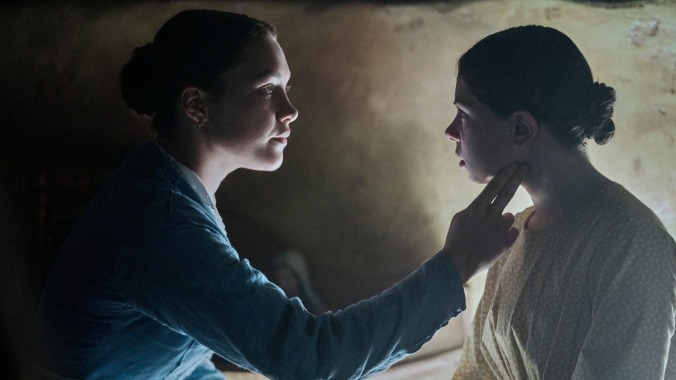A mesmerizing Florence Pugh contemplates miracles in The Wonder
Filmmaker Sebastián Lelio impresses yet again with the story of an English nurse's test of faith in a 19th century Irish village

If a crisis of faith is a journey from belief to doubt, the opposite could be referred to as a come-to-Jesus moment. Writer-director Sebastián Lelio’s The Wonder (in select theaters November 2 and on Netflix November 16) is an example of the latter, the tale of a skeptic who’s tempted into seeing the light while investigating a miracle. Thanks to a typically mesmerizing leading turn from Florence Pugh, it’s a film that can hold up a mirror to believers and nonbelievers alike as the best stories of faith do.
Think of Fox Mulder and Dana Scully, the conspiracist and the cynic—there’s tension and baggage and, yes, wonder to be found when facing the unknown. Believe it or not (and that is the theme here), The Wonder has more in common with The X-Files than it appears on paper. This is a mystery, after all, one that sheds light less on its central, unanswerable question than on the people seeking answers. The fun, or in this case the eerily tense psychological drama, comes from the asking. In 1862, English nurse Lib Wright (Pugh) arrives in the Irish countryside to scrutinize what has become a local tourist attraction: Is Anna O’Donnell (Kíla Lord Cassidy) truly living off manna from heaven instead of food? Is this young girl’s allegedly four-month fast divine intervention, or is there a more Earth-bound explanation—is it a stunt, a scam, or a case of religious extremism and abuse?
Villagers in the town, which is nestled among windswept Midlands and is still recovering from the trauma of Ireland’s Great Famine, fall mostly on the spiritual side of that divide. A committee of five men, including a doctor (Toby Jones), has hired Lib and a taciturn nun (Josie Walker) to observe Anna in alternating shifts around the clock to present their unbiased findings and get to the bottom of this phenomenon. Lib, a Crimea war nurse with a tragic past, is well suited to the task; unbothered by the still-fraught tensions between Ireland and England that make her welcome less than warm, she administers brusque physicals upon Anna, determined to debunk the notion that piety can provide sustenance.
It isn’t long before Anna’s pure innocence causes Lib to succumb. Not, as you might expect, into Catholicism or any dismissal of her facts-first approach. Rather, she begins to care for Anna, eventually enough to defy O’Donnell matriarch Rosaleen (a haunting Elaine Cassidy), whose devotion is fueled by grief over losing a son—“My children will be in heaven,” she proclaims with wide-eyed zeal. In firelit interludes, we learn why the cagey Lib might come to treat Anna as something like a daughter. Alongside a similarly realist reporter (Tom Burke) with a surprising past of his own, Lib unearths her own capacity for fervent obsession as Anna’s health inevitably deteriorates.
Lelio establishes that ticking clock with masterful pacing, lending thriller-like urgency to what is otherwise a solemn character study. As he did in his daring Disobedience, Lelio offers up plenty of grappling with doctrine. And, as with Daniela Vega in his Oscar-winning A Fantastic Woman, he creates compelling interiority for his leading lady. Earlier this year in Don’t Worry Darling, Pugh made something out of nothing by unspooling another, far clumsier mystery; she’s making a name for herself playing unapologetically assertive women and proves a wonderful fit for a restrained historical piece centered on one. And she deftly cedes the spotlight, especially in an emotional knockout of a later scene that confirms Cassidy is a rising star to watch.
There’s an underwritten romance and a few familiar beats to Lib’s backstory that cause the character to succumb to some Hollywoodization, suggesting Lelio and co-writers Alice Birch and Emma Donoghue (the latter penned the 2016 novel of the same name) are filling in motivations for her increasingly desperate actions. This story’s time and place provide more than enough reason for desperation, as do the claustrophobic compositions from cinematographer Ari Wegner; much like in Donoghue’s Room, in fact, there’s a palpable sense that confined spaces can be both suffocating and intimate. If there’s one indelible takeaway from this film, it’s production designer Grant Montgomery’s somber interiors, with pale sun or candlelight failing to stretch across sickly green walls.
The real wonders in The Wonder are those visuals combined with Matthew Herbert’s ethereal music, which imbues the wailing strings you might expect from a period drama with modern, even electronic-esque sounds. That contemporary element echoes the meta flourishes that bookend this tale, on which mileage will vary—bold framing devices are welcome, but why this one should be delivered by Niamh Algar, playing a character mostly insignificant to this plot, is a tad puzzling. Yet in today’s age of media misinformation, as Judi Dench calls for The Crown to specify it’s a work of fiction, hell, why not coax 21st century skeptics into connecting with 19th century devotees?
What’s extraordinary (to this nonbeliever at least) about this story’s third act is that it solves the central mystery without sacrificing Lelio’s atmospheric ambiguity. Where The Wonder could easily opt for a vague middle ground—Mulder seeing God or Scully losing faith in science—it instead commits to an explanation behind Anna’s sanctity. Spoiler alert: There is no miracle. But when the credits roll, why does it feel like we’ve witnessed something miraculous? It’s a disarming trick that mirrors Lib’s journey of self-discovery. Lelio has guided us along a spiritual path that ends up firmly in our earthly realm, yet somehow what lingers is more magic than realism.